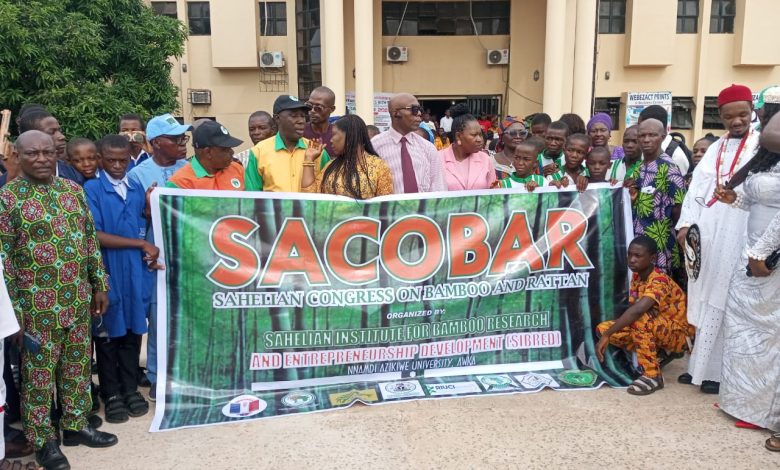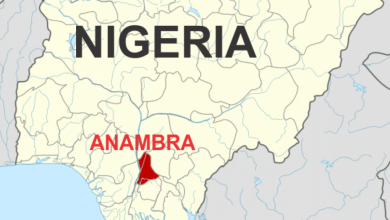
The Sahelian Institute for Bamboo Research and Entrepreneurship Development, (SIBRED) at Nnamdi Azikiwe University, Awka, Nigeria has held its first Sahelian Congress on Bamboo and Rattan (SACOBAR) with stakeholders resolving to work assiduously together towards the development of bamboo and rattan industry in Nigeria and the entire Sub-saharan Africa.
The historic hybrid event with the theme, “Bamboo and Rattan Innovations for Entrepreneurship, Livelihoods and Economic Development in Sub-saharan Africa,” was attended by members of the academia, captains of Industry, bamboo farmers and processors as well as relevant government MDAs and various secondary schools in Anambra State, including the SIBRED Co-initiator and Deputy Provost, College of Health Services, Nnewi, Professor. Ejetuluchukwu Obi.
The Vice Chancellor, Nnamdi Azikiwe University Awka, Prof. Charles Esimone, represented by Deputy Vice Chancellor, Administration, Prof. Joseph Ikechebelu, appreciated the growing attention bamboo and rattan resources are attracting in Sahelian Africa countries through SIBRED.
The Vice Chancellor was optimistic that the future is bright with the number of school children in attendance who have demonstrated passionate interest in maximizing the benefits of bamboo and rattan resources.
In an address of welcome, the Founding Director of SIBRED, Mr. John Agbo Ogbodo, noted that SACOBAR starting on the same day the Global Community was marking World Biodiversity Day, is instructive.
“Coincidentally, World Biodiversity Day reminds us all to cherish and protect the diverse species that help to nurture our planet Earth. Bamboo and rattan plants are among the forest resources and we must all join hands to promote their sustainable utilization towards meeting the overall objective of the World Biodiversity Day”
“Bamboo and rattan resources have the extra ordinary power to restore degraded lands. This offers opportunities for those working in agriculture and forestry as well as investors in nature based solutions for mitigating the effects of climate change and adaptation”.
Ogbodo happily remarked that SIBRED inaugurated six months ago under the leadership of the outgoing Vice Chancellor of the institution, Prof. Charles Esimone, to provide services to 16 countries in West and Central Africa, has recorded some modest achievements in line with its mandate including its inauguration and invitation of its director as a guest speaker at the first Bamboo Day celebration in Abuja in December last year.
“We entered into partnership with the Chinese Ambassador to Nigeria, which has yielded a positive result with one of our research associates, Dr Temple Nwankwo, currently in Beijing, China, for a two-week training. We are also in partnership with not less than ten international organizations to help us in achieving our common goals”.
Mrs. Diana Doheny, the Chairperson of the International Planning Committee for the Congress, in a roundtable discussion, solicited the need for the Sahelian region to embrace regenerative agricultural practices, which promote natured-based approach to agriculture and contribute to the fight against climate change.
In his opening remarks, the Chairman of the Occasion, Dara Chijioke Okechukwu, noted that bamboo has gone beyond the level it is in Nigeria and Africa, hence the need for deliberate efforts towards reversing the trend. “Today is not late to maximize the benefits of bamboo. We must resolve to go ever forward and never backward again”.
The Minister of State Environment, Dr Ishaq Salako, represented by the Director, Forestry, Dr Moses Ama, remarked that bamboo and rattan are valuable resources with immense potentials to further sustainable development and environmental sustainability in the West African region.
The Minister commended the theme of the congress, which is “Research, Knowledge Transfer and Capacity Building and Techniques for Sustainable Bamboo and Rattan Cultivation and Conservation in Sub-saharan Africa”.
“By coming together to share our essential needs, exchange knowledge and build our collective capacity, we are taking a significant step towards unlocking the potentials of these great resources”.
The keynote Speaker, Dr Ratan Lal Banik, enumerated the benefits of bamboo which Africa and other parts of the world can enjoy.
“Bamboo is now widely gaining recognition as the fast renewable biomass resource of the future. Bamboo Cultivation of bamboo on a large-scale outside forests is an emerging trend in many countries of the world to meet the growing demand is due to the newer applications than the fast renewable bamboo has been put to in recent times as alternative to timber and plastics and as raw material for biofuel.
Dr Banik also appreciated the immense potential of bamboo in the fight against climate change and in achieving the Sustainable Development Goals. “Managed bamboo forests sequester more carbon than most fast-growing forest tree species and harvesting and converting into durable products locks up carbon for long time.
“Bamboo plantations improve economic status of bamboo farmers through livelihood improvement options and carbon credits. Disaster-resilient bamboo construction provides relief from extreme weather events and natural disasters while the plantations themselves help prevent soil erosion, landslides and floods”.
The Regional Director, Latin America and the Caribbean and Coordinator, International Network of Universities and Research Centers related to Bamboo (RUICI), Ecuador, Pablo Jacome Estrella, described bamboo as a symbol of sustainability.
“Bamboo plays a very huge role in environmental sustainability and boost the fight against climate change. Sahelian region current being bedevilled by climate change can benefit immensely from it for land reforestation and to stop desertification”
For his part, Chief John Ogwu, the National President of the Bamboo and Rattan Farmer Association of Nigeria, (BARFAN), described SIBRED so far as the best thing to happen to bamboo in Nigeria even as he called on the government to yield management of bamboo to the private sector.
“Bamboo is badly neglected in Nigeria. SIBRED came to reverse the trend. Unless bamboo is private sector-driven, we will keep going round the circle”.
SACOBAR ’24 featured exhibition of various bamboo-made items by selected secondary schools and UNIZIK’s Department of Fine Arts as well as a roundtable discussion, featuring Dr Muralidharan Maviton, the Chairman, INBAR Taskforce on Sustainable Bamboo Management, India and Dr Yigardu Mulato, of the Ethiopian Forestry Department (EFD), Addis Ababa, Ethiopia.




